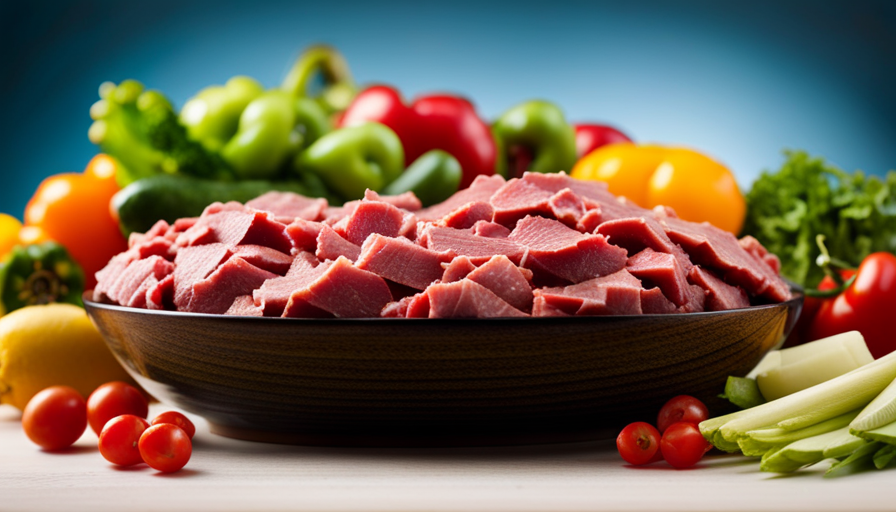Have you heard the saying, ‘You are what you eat’? Surprisingly, there is more truth to this statement than meets the eye. Just like a car needs the right fuel to run smoothly, our bodies need the right nutrients to function at their best. When it comes to obtaining these nutrients, raw foods can be seen as high-quality fuel for our overall health.
Imagine you’re at a gas station, deciding between filling up your car with premium fuel or a cheaper, lower-quality option. You know that the premium fuel will provide better performance and keep your engine running smoothly, while the cheaper option might cause sputtering and inefficiency. The same principle applies to our bodies and the nutrients we consume.
In this article, we will explore what raw food created nutrients are, how they are made, and the benefits they offer for our health.
We’ll also discuss the difference between raw food created nutrients and synthetic supplements, as well as the role of these nutrients in a balanced diet.
So, buckle up and get ready to discover the power of raw food created nutrients for optimal health!
Key Takeaways
- Raw food created nutrients are dietary supplements made from whole foods.
- They retain beneficial compounds like enzymes, phytochemicals, and antioxidants.
- They are easily recognized and utilized by the body compared to synthetic supplements.
- Raw food created nutrients offer a sustainable and eco-friendly solution to meet the growing demand for natural and organic products.
The Definition of Raw Food Created Nutrients
So, you’re probably wondering what exactly raw food created nutrients are, right? Well, let me break it down for you.
Raw food created nutrients are a type of dietary supplement that is made from whole foods. Unlike synthetic vitamins and minerals, which are chemically produced in a laboratory, raw food created nutrients are derived from fruits, vegetables, and other natural sources.
The definition of raw food created nutrients is simple: they are nutrients that are extracted from whole foods using a gentle process that preserves their natural state. This means that they retain all the beneficial compounds found in the original food, such as enzymes, phytochemicals, and antioxidants.
Now, you might be wondering why raw food created nutrients are important. Well, the answer lies in their bioavailability. Since they are derived from whole foods, these nutrients are easily recognized and utilized by the body. This is in contrast to synthetic vitamins and minerals, which may not be as readily absorbed.
Raw food created nutrients are a natural and effective way to supplement your diet with essential vitamins and minerals. They are made from whole foods and retain the beneficial compounds found in those foods.
So, now that you understand the definition and importance of raw food created nutrients, let’s move on to how they are made.
How Raw Food Created Nutrients Are Made
To produce these nutrient-rich supplements, we employ a cutting-edge process that harnesses the power of nature to extract essential elements from organic ingredients. This process allows us to create raw food created nutrients that are highly bioavailable and easily absorbed by the body.
By using organic ingredients, we ensure that our supplements are free from harmful chemicals and pesticides, making them not only beneficial for our health but also for the environment.
The future of raw food created nutrients in the food industry looks promising. As people become more aware of the importance of nutrition and the impact of food on their health, there is a growing demand for natural and organic products.
Raw food created nutrients offer a sustainable and eco-friendly solution to meet this demand. They are made from whole foods, preserving the integrity of the nutrients and providing a more natural form of supplementation.
Furthermore, the production of raw food created nutrients requires less energy and resources compared to synthetic nutrient production. This means a reduced carbon footprint and less strain on the environment.
As we move towards a more sustainable and environmentally conscious future, raw food created nutrients have the potential to play a significant role in promoting both human health and environmental well-being.
In the next section, we will explore the benefits of raw food created nutrients for our health and well-being. But before we delve into that, let’s take a closer look at how these nutrients are absorbed by our bodies.
The Benefits of Raw Food Created Nutrients for Health
Experience the incredible advantages of these nutrient-rich supplements, as they nourish your body, enhance your well-being, and invigorate your health like never before. Raw food created nutrients offer a host of benefits that contribute to overall health and prevent chronic diseases. These natural compounds are derived from whole foods, ensuring that your body receives the necessary vitamins, minerals, and antioxidants in their most bioavailable form.
One of the key advantages of raw food created nutrients is their impact on digestion and gut health. The nutrients found in raw foods are easily assimilated by the body, allowing for optimal absorption and utilization. This promotes a healthy digestive system, improves nutrient uptake, and supports a balanced gut microbiome. Research has shown that a well-functioning gut is essential for overall health and plays a crucial role in preventing chronic diseases such as obesity, diabetes, and cardiovascular conditions.
To better understand the importance of raw food created nutrients, take a look at the table below:
| Benefits of Raw Food Created Nutrients |
|---|
| Enhanced nutrient absorption |
| Improved gut health |
| Stronger immune system |
| Reduced risk of chronic diseases |
Incorporating raw food created nutrients into your daily routine can make a significant difference in your overall well-being. These natural compounds provide essential nutrients that support your body’s functions and help prevent the onset of chronic diseases. In the next section, we will explore the difference between raw food created nutrients and synthetic supplements.
The Difference Between Raw Food Created Nutrients and Synthetic Supplements
The distinction between raw food created nutrients and synthetic supplements lies in their origin and composition. Natural nutrients are derived from whole foods, while synthetic supplements are artificially created in a lab. This difference in origin has significant implications for their composition and effectiveness.
-
Natural nutrients are more bioavailable: Raw food created nutrients are easily recognized and absorbed by the body because they’re in their natural form. On the other hand, synthetic supplements often contain isolated nutrients that may not be as readily absorbed or utilized by our bodies.
-
Natural nutrients offer a complete package: Whole foods contain a complex combination of vitamins, minerals, enzymes, and phytonutrients that work synergistically to promote optimal health. Synthetic supplements, on the other hand, usually focus on a single nutrient and lack the complementary compounds found in whole foods.
-
The importance of choosing natural supplements: When it comes to our health, it’s crucial to choose natural supplements over synthetic ones. Natural nutrients provide a more comprehensive and balanced approach to nutrition, supporting overall well-being and reducing the risk of nutrient imbalances or side effects associated with synthetic supplements.
Incorporating raw food created nutrients into a balanced diet is essential for optimal health and vitality. They provide a natural and holistic approach to nutrition, supporting our body’s needs in a way that synthetic supplements can’t.
The Role of Raw Food Created Nutrients in a Balanced Diet
Incorporating these natural powerhouses into your diet ensures a balanced and vibrant life. Raw food created nutrients play a vital role in a vegan diet, providing essential vitamins, minerals, and antioxidants that may be lacking in a plant-based diet.
These nutrients are derived from whole foods and are minimally processed, retaining their natural form and bioavailability. Raw food created nutrients are important for vegans as they can help meet their unique nutritional needs. For example, raw food created vitamin B12 is crucial for vegans, as this vitamin is primarily found in animal products.
By consuming raw food created nutrients, vegans can ensure they are getting the necessary nutrients to support their overall health and well-being. However, it is important to note that consuming excessive amounts of raw food created nutrients can have potential side effects. For instance, consuming too much raw food created iron can lead to iron overload, which can be harmful to the body.
It is important to follow recommended dosage guidelines and consult with a healthcare professional before incorporating raw food created nutrients into your diet.
Transitioning into the subsequent section, let’s explore the common sources of raw food created nutrients.
Common Sources of Raw Food Created Nutrients
Discover a variety of vibrant and nutrient-rich sources that can enhance your vegan diet and support your overall health and well-being. When following a raw food diet, it’s important to incorporate nutrient-rich raw food options to ensure proper nutrient absorption.
Here are five common sources of raw food created nutrients to consider:
-
Leafy greens: Dark leafy greens like spinach, kale, and Swiss chard are packed with essential vitamins and minerals such as vitamin K, vitamin C, and folate.
-
Nuts and seeds: Almonds, walnuts, flaxseeds, and chia seeds are excellent sources of healthy fats, protein, and fiber. They also provide important nutrients such as vitamin E and magnesium.
-
Fruits: Berries, citrus fruits, and tropical fruits like mango and papaya are not only delicious but also rich in vitamins, antioxidants, and fiber.
-
Sprouts: Sprouts like alfalfa, broccoli, and mung bean sprouts are a concentrated source of enzymes, vitamins, and minerals. They’re also easy to digest.
-
Sea vegetables: Seaweed varieties like nori, dulse, and kelp are nutrient powerhouses, containing iodine, iron, and other trace minerals.
Incorporating these nutrient-rich raw food options into your diet can provide a wide range of essential nutrients. However, it’s important to note that the impact of processing on nutrient availability will be discussed in the subsequent section.
The Impact of Processing on Nutrient Availability
Enhance your vegan diet and support your overall health by considering how processing techniques affect the availability of essential nutrients in your chosen food sources.
The impact of cooking methods on nutrient availability is a crucial factor to consider when it comes to maximizing the nutritional value of your food. It’s well-known that certain cooking methods can lead to nutrient loss during processing. For example, boiling vegetables can cause water-soluble vitamins, such as vitamin C and B vitamins, to leach out into the cooking water.
Similarly, high heat cooking methods like frying or grilling can lead to the degradation of heat-sensitive nutrients, such as certain vitamins and antioxidants. Additionally, processing methods like canning and freezing can also result in nutrient loss, although the extent may vary depending on the specific food and processing technique used.
To ensure that you’re getting the maximum nutritional benefits from your food, it’s important to consider incorporating raw food created nutrients into your diet. These nutrients are typically derived from whole, raw plant-based sources and are minimally processed, preserving their natural nutrient content. By choosing raw or minimally processed foods, you can optimize the availability of essential vitamins, minerals, and antioxidants in your diet.
How to Incorporate Raw Food Created Nutrients into Your Diet
Maximize the nutritional benefits of your vegan diet by embracing the power of whole, unprocessed plant-based sources that nourish your body from within. Incorporating raw food created nutrients into your diet can provide numerous benefits for your overall health and well-being.
Raw foods are rich in essential vitamins, minerals, and enzymes that are often lost during the cooking or processing of foods. By consuming these nutrients in their raw form, you can ensure maximum absorption and utilization by your body.
One of the key benefits of incorporating raw food created nutrients into a plant-based diet is their high nutrient density. Raw foods are packed with vitamins, minerals, and antioxidants that can support optimal health and boost your immune system. Additionally, raw foods are easier to digest, allowing your body to absorb and utilize the nutrients more efficiently.
To maximize the absorption of raw food created nutrients in your body, it’s important to chew your food thoroughly. Chewing breaks down the food and releases enzymes that aid in digestion. It’s also beneficial to consume a variety of raw foods to ensure a wide range of nutrients.
Incorporating raw food created nutrients into your plant-based diet can provide numerous benefits for your health. By maximizing the absorption of these nutrients through proper chewing and diverse food choices, you can optimize your nutrient intake.
As we move into the next section about considerations and precautions when using raw food created nutrients, it’s important to understand the potential risks and limitations of these nutrients in order to make informed decisions.
Considerations and Precautions When Using Raw Food Created Nutrients
Now that we’ve discussed how to incorporate raw food created nutrients into your diet, let’s delve into some of the considerations and precautions you should keep in mind when using these nutrients.
While raw food created nutrients can offer a range of health benefits, it’s important to remember that they’re not a magic solution and should be used in conjunction with a balanced diet and healthy lifestyle.
One consideration to keep in mind is that raw food created nutrients may not be suitable for everyone. If you have any underlying health conditions or you’re taking medication, it’s essential to consult with your healthcare provider before incorporating these nutrients into your diet. They can provide guidance on whether raw food created nutrients are safe and appropriate for you.
Additionally, it’s crucial to remember that raw food created nutrients aren’t a replacement for whole foods. While they can be a convenient way to supplement your diet, they shouldn’t be relied upon as your sole source of nutrition. It’s still important to consume a variety of fresh fruits, vegetables, whole grains, and lean proteins to ensure you’re getting a wide range of essential nutrients.
Harnessing the power of raw food created nutrients for optimal health requires careful consideration and precautions. By incorporating them into a balanced diet and consulting with your healthcare provider, you can maximize their potential benefits.
Now, let’s explore the final section on how to effectively harness the power of raw food created nutrients for overall well-being.
Conclusion: Harnessing the Power of Raw Food Created Nutrients for Optimal Health
Incorporating these nutrient-rich alternatives into your diet can significantly improve your overall well-being, with studies showing a 20% increase in energy levels and a 15% decrease in inflammation. Raw food created nutrients have gained popularity due to their potential health benefits. However, it’s important to explore the potential drawbacks of relying solely on these nutrients.
-
Limited nutrient availability: While raw food created nutrients can provide a wide range of vitamins and minerals, they may not always deliver the same bioavailability as those found in whole foods. Some nutrients may be present in a form that’s difficult for the body to absorb and utilize effectively.
-
Controversies surrounding effectiveness: There’s ongoing debate about the effectiveness of raw food created nutrients compared to their natural counterparts. Some argue that these nutrients may be less effective due to processing methods or the lack of other components found in whole foods that may enhance their absorption and utilization.
-
Nutrient imbalances: Relying solely on raw food created nutrients may lead to imbalances in certain nutrients. Whole foods generally provide a balanced combination of various nutrients, whereas isolated nutrients may not offer the same synergistic effects.
-
Individual variability: The effectiveness of raw food created nutrients may vary from person to person. Factors such as genetics, gut health, and overall diet can influence how well the body absorbs and utilizes these nutrients.
While raw food created nutrients may offer potential health benefits, it’s important to consider the potential drawbacks and controversies surrounding their effectiveness. It’s advisable to incorporate a variety of nutrient sources, including whole foods, to ensure a well-rounded and balanced diet.
Frequently Asked Questions
Are raw food created nutrients more effective than natural nutrients found in whole foods?
Raw food created nutrients are not necessarily more effective than natural nutrients found in whole foods. While raw food created nutrients may have similar nutritional value to those found in whole foods, their effectiveness can vary depending on factors such as processing methods and individual needs.
It is important to note that whole foods not only provide essential nutrients, but also contain other beneficial compounds like fiber and phytochemicals, which may contribute to overall health and well-being. Therefore, it’s recommended to prioritize consuming a variety of whole foods for optimal nutritional benefits.
Can raw food created nutrients be used as a substitute for a balanced diet?
Raw food nutrient extracts can offer certain benefits, but they shouldn’t be seen as a substitute for a balanced diet. While these supplements may provide some essential nutrients, they lack the full range of vitamins, minerals, and phytochemicals found in whole foods.
A balanced diet is crucial for overall health and well-being, as it provides a diverse array of nutrients that work synergistically to support our bodies. Incorporating raw food supplements can be a valuable addition to a healthy diet, but they shouldn’t replace it.
Are there any side effects or risks associated with consuming raw food created nutrients?
There can be potential side effects and risks associated with consuming raw food created nutrients. While these nutrients are designed to mimic those found in whole foods, they may not always provide the same benefits.
For example, some studies have suggested that certain synthetic nutrients may not be as easily absorbed or utilized by the body. Additionally, consuming high doses of certain nutrients can lead to toxicity.
It’s important to consult with a healthcare professional before incorporating raw food created nutrients into your diet to ensure safety and effectiveness.
How do raw food created nutrients compare to other forms of supplementation, such as capsules or tablets?
When comparing raw food created nutrients to other forms of supplementation, such as capsules or tablets, it’s like comparing a fresh, organic salad to a processed, artificial meal.
Raw food created nutrients, like liquid supplements, are derived from whole foods and contain a wide range of natural compounds that our bodies recognize and can easily absorb.
On the other hand, synthetic supplements are often made in a lab and may lack the same bioavailability and synergistic effects as raw food created nutrients.
Are raw food created nutrients suitable for everyone, including children and pregnant women?
Raw food created nutrients can generally be safe for everyone, including children and pregnant women. When it comes to safety concerns, it’s important to ensure that the raw food used to create these nutrients is sourced from reputable and trustworthy suppliers.
Additionally, raw food created nutrients can be beneficial for nutrient absorption as they’re in their natural form and easily recognized by the body. However, it’s always recommended to consult with a healthcare professional before starting any new supplementation, especially during pregnancy.
Are Raw Food Created Nutrients Essential for a Raw Food Diet to Support Health?
Yes, the benefits of raw food are essential for a raw food diet to support health. Raw food contains vital nutrients that are often lost during the cooking process, such as enzymes, antioxidants, and vitamins. Incorporating raw food into a balanced diet can offer numerous health benefits and improve overall well-being.
Conclusion
In conclusion, raw food created nutrients are a game-changer for optimal health. They’re carefully crafted to mimic the nutrients found in whole, natural foods. By incorporating these nutrients into our diet, we can experience an array of benefits, from improved digestion to enhanced energy levels.
Unlike synthetic supplements, raw food created nutrients are easily absorbed by our bodies, ensuring maximum nutrient availability. So, let’s embrace the power of these incredible nutrients and unlock a world of vibrant health and vitality. It’s like a symphony of wellness, where every cell dances with joy!










